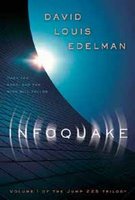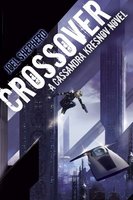The Voyage of Night Shining White is part of Chris' Celestial Empire sequence, an ongoing collection of stories set across hundreds of years in an alternate earth where the Treasure Fleets of the 15th century Chinese Empire were never recalled, but continued to carry Chinese expansion throughout the world (and beyond). The first of these stories, "O One", was written for my anthology Live Without A Net
"O One" was one of my three favorite stories in the anthology, and was called out in several reviews. Although the anthology is now out of print, copies can still be had on Amazon and elsewhere, and you can read it online here. Please do! You won't be sorry. Meanwhile, I was quite taken with the notion of an Imperial China in space and wanted to see more. So although Chris hadn't initially planned to develop any more of these tales, during my brief tenure as a magazine editor, I commissioned a novella from him, specifically requesting a story about the actual migration to the red planet. The Voyage of Night Shining White was the result. But, alas, in a tale about which no more need be said that has been said already, it was not to be. Suffice to say, this brilliant tale was left without a home. (Aside: you can see the intended Stephan Martiniere cover here, never utilized, but available afor sale as a print.)
But while NSW floated in limbo, Chris continued to write Celestial Empire tales. “Red Hands, Black Hands” (read online) appeared in the December, 2004 issue of Asimov's Science Fiction (December, 2004) to good acclaim. Nick Gevers, writing in the November 2004 issue of Locus, praise it thusly:
"The highly talented Chris Roberson, recent winner of the Sidewise Award for his story 'O One', continues that tale’s vein of opulent Sinophilia in 'Red Hands, Black Hands' – in this alternate timeline, Imperial China dominates the world in place of Europe – but exacerbates the peculiarity of the setting by transferring it to a partly terraformed Mars ruled by the Mandarins. The Emperor’s oppressive writ runs severely, and a woman novelist, part of a circle of rather dilettantish bohemians, becomes involved in serious seditious activity, falling in love with a revolutionary and spreading his propaganda via her writings (which include an opera libretto portraying a uchronia under Aztec supremacy, wheels within counterfactual wheels…). The atmosphere is sumptuous, the invention lavish; the experience of reading the story is mind-expanding."
Step in Pete Crowther and PS Publishing, who bought a subsequent tale, "Gold Mountain." The story, about the construction of the Space Elevator as the first stage to colonizing Mars, appeared in Postscripts Magazine, Issue 5. It was around that time that PS Publishing bought The Voyage of Night Shining White as well - to my considerable delight. (The full illustration for the PS Publishing book, by Tomislav Tikulin, can be seen here.) I can't tell you how thrilled I am that this novella is finally out, as I've been aware of its brilliance for some time and eager for others to share in it. It's been like having a secret and being unable to tell anyone.
Meanwhile, Chris has two more Celestial Empire stories forthcoming, "All Under Heaven," appearing in the Firebirds Soaring anthology (Firebird, 2008) and "Metal Dragon Year" due to appear in Interzone. I've not read either of these yet, but I can't wait for their publication.
But wait - there's more! Two Celestial Empire novels are also on the horizon. The Dragon's Nine Sons will appear from the new Solaris imprint in 2008. From their press release:
"The Dragon’s Nine Sons is an epic story of war in space and of the people caught in-between when empires clash. A disgraced naval captain and a commando who knows secrets he should never have learned are picked to lead a suicide mission, piloting a salvaged Mexica spacecraft to Xolotl, the asteroid stronghold of their enemies, armed with enough explosives to reduce the Mexica base to dust. But when they arrive to find dozens of Chinese prisoners destined to be used as human sacrifices, their suicide mission suddenly becomes a terrifying rescue operation. The Dragon’s Nine Sons is the first novel in The Celestial Empire sequence, an epic, sprawling alternate history sequence in which China rises to world domination in the early days of the 15 th century and goes on to conquer the stars."
And, also due in 2008, a Celestial Empire Young Adult novel from Firebird – Iron Jaw & Hummingbird is the tale of "two youths caught up in the revolution against a despotic Martian government controlled by the Dragon Throne of Imperial China." As Chris says, the novel is "essentially an opera on a terraformed Mars, it's got bandit chiefs, revolutionaries, religious fanatics, corrupt generals, wastrel second sons, and thieves.... the same old, same old."
But while you wait, read the two existing Celestial Empire stories online, track down "Gold Mountain," which was reprinted in The Year's Best Science Fiction Twenty-third Annual Collection



